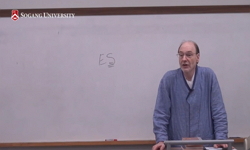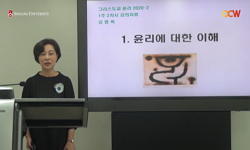완화적 진정은 의사조력자살과는 그 시행 의도에 있어서 분명한 차이가 있는 임종기 치료 결정의 한 방법으로, 다른 방법으로는 어떻게 할 수 없는, 임종기 환자의 고통을 완화시킬 수 있는 ...
http://chineseinput.net/에서 pinyin(병음)방식으로 중국어를 변환할 수 있습니다.
변환된 중국어를 복사하여 사용하시면 됩니다.
- 中文 을 입력하시려면 zhongwen을 입력하시고 space를누르시면됩니다.
- 北京 을 입력하시려면 beijing을 입력하시고 space를 누르시면 됩니다.

임종기 환자 치료 결정에 있어서 그리스도교 바탕의 온정적 간섭주의 의사 환자 관계 = End-of-Life Care Decision-Makings and Paternalism based on Catholicism
한글로보기https://www.riss.kr/link?id=A100089042
- 저자
- 발행기관
- 학술지명
- 권호사항
-
발행연도
2012
-
작성언어
-
- 주제어
-
KDC
190
-
등재정보
KCI등재
-
자료형태
학술저널
-
수록면
61-87(27쪽)
- 제공처
-
0
상세조회 -
0
다운로드
부가정보
국문 초록 (Abstract)
완화적 진정은 의사조력자살과는 그 시행 의도에 있어서 분명한 차이가 있는 임종기 치료 결정의 한 방법으로, 다른 방법으로는 어떻게 할 수 없는, 임종기 환자의 고통을 완화시킬 수 있는 의료 행위이다. 모든 의료 행위의 시행에는 그 의료 행위를 시행 받게 되는 환자의 자율적인 동의가 필수적이다. 따라서 완화적 진정에도 환자의 자율적인 동의는 필수적이다. 하지만 완화적 진정과 같은 임종기 환자의 치료 결정에 있어서 환자의 자율성에 대한 존중에는 분명한 한계가 있으며 환자의 상황에 대한 잘못된 연민을 바탕으로 한 접근은 피해야 한다. 환자의 자율성이 제한되는 상황에서 의료진의 온정적 간섭주의(paternalism)에 따른 결정의 단점을 최소화하기 위해서 사회적 가이드라인 설정의 필요성이 제시되고 있다. 그러나 개별의 임상 상황에서 가장 중요한 것은 사회적 가이드라인 준수 여부가 아니라 현재의 계약적 관계에서는 이루어지기 힘든, 신뢰를 바탕으로 한 선행 중심의 의사-환자 관계이다. 즉 임종기 환자의 치료 결정에 있어서 그리스도교 연민을 가진 의사의 온정적 간섭주의적 접근은 큰 중요성을 갖고 있다. 완화적 진정에 대한 가장 좋은 시행 결정 방법은 상호 신뢰를 바탕으로 한 선행 중심의 온정적 간섭주의 의사 환자 관계를 토대로 환자의 존엄성을 최대한 보존해주도록 하는 데 있다. 그리스도교 연민을 가진 의료진의 온정적 간섭주의 바탕의 임종기 의사 결정이 최선인 것이다.
다국어 초록 (Multilingual Abstract)
Palliative Sedation has a significant difference with Physician Assisted Suicide on the intention of the procedure, and is one of End-of-Life Decision-Makings for patients who are in refractory symptoms. All medical practices require patients' autono...
Palliative Sedation has a significant difference with Physician Assisted Suicide on the intention of the procedure, and is one of End-of-Life Decision-Makings for patients who are in refractory symptoms.
All medical practices require patients' autonomous agreement, who will be taken the medical practice, but, during End-of-Life care decision-makings such as Palliative Sedation, respect for patients' autonomy should be considered with a significant limitation and the approach by mistaken compassionate emotions should be avoided.
The necessity of guidelines for End-of-Life care Decision-Makings has been increased in order to minimize the demerits of paternalistic decisions when patients' autonomy is restricted, but, these guidelines have so much weak effects on each individualized patients' situation during the medical practice. It is not the focus whether one abides by the guidelines or not ; doctor patient relationship relied on the principle of beneficence-in-trust should be the key to resolving the conflict between paternalism and patient autonomy.
The proper method to determine the decisions on Palliative Sedation is based on the principle of beneficence-in-trust. The best interests of patients, including autonomy, are held in trust by the physician and patient alike. Furthermore, the End-of-Life care decision-makings of physicians who have compassion related swith Catholicism also should be considered strongly as the key.
목차 (Table of Contents)
- Ⅰ. 시작하며
- Ⅱ. 의사-환자 관계와 임종기 의사 결정
- Ⅲ. 그리스도교적 연민을 가진 의사
- Ⅳ. 마치며
- 참고문헌
- Ⅰ. 시작하며
- Ⅱ. 의사-환자 관계와 임종기 의사 결정
- Ⅲ. 그리스도교적 연민을 가진 의사
- Ⅳ. 마치며
- 참고문헌
- 초록
- Abstract
동일학술지(권/호) 다른 논문
-
- 가톨릭생명윤리연구소
- 이향만(Lee, Hyang Man)
- 2012
- KCI등재
-
- 가톨릭생명윤리연구소
- 진영진(Jin, Young Jin)
- 2012
- KCI등재
-
- 가톨릭생명윤리연구소
- 황승희(Hwang, Seung Heui)
- 2012
- KCI등재
-
- 가톨릭생명윤리연구소
- 류정호
- 2012
- KCI등재




 스콜라
스콜라






